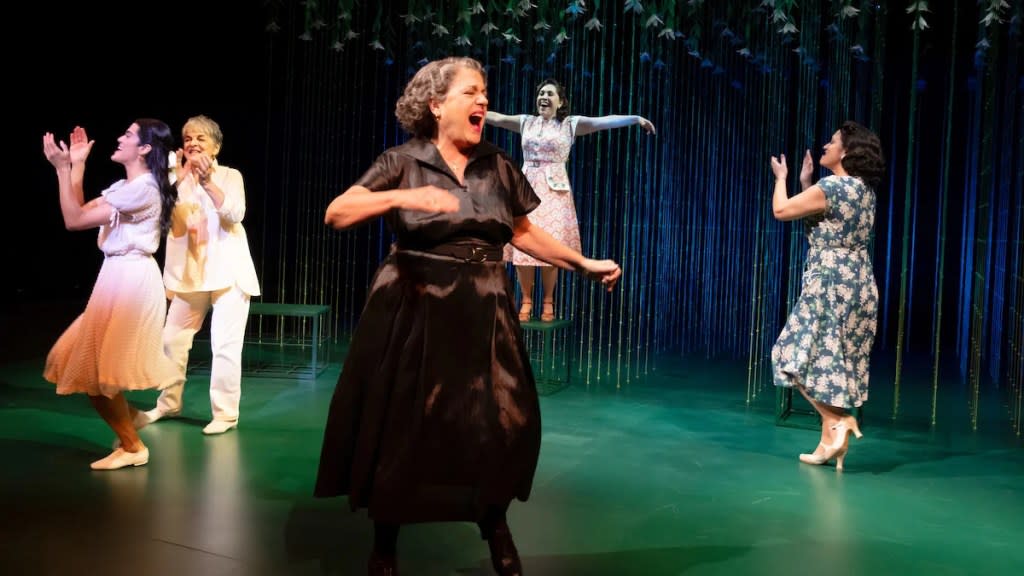‘The Gardens of Anuncia’ Off Broadway Review: How Great Art Survives Terrible Politics

- Oops!Something went wrong.Please try again later.
- Oops!Something went wrong.Please try again later.
Not many director-choreographers get to direct their lives and put it on stage or screen. Bob Fosse’s “All That Jazz” comes to mind, and now there is Graciela Daniele’s direction of “The Gardens of Anuncia.”
Fosse and Daniele’s life stories could not be more different. Where Fosse had personal demons and substance abuse to overcome (or not), Daniele had Juan and Eva Peron to deal with. Michael John LaChiusa’s touching new musical, “The Gardens of Anuncia,” under the direction of Daniele, opened Monday at the Mitzi E. Newhouse Theater at Lincoln Center.
Born in the decade before Peron came to power in Argentina, Daniele started life as a dancer, supported by the collective belief in her talent of three strong women — her mother, a maiden aunt and her maternal grandmother. Even the incarceration of Mami did not prevent Daniele from escaping Argentina to enjoy a successful ballerina’s life in Europe, which eventually led to her choreographing and then directing on Broadway and elsewhere. Even for theatergoers who haven’t seen her work in musicals as varied as “Once on This Island,” “The Pirates of Penzance” and “Ragtime,” Daniele’s biography amazes.
It helps that she has a terrific storyteller. “The Gardens of Anuncia” is arguably LaChiusa’s finest musical, because it is also deceptively his most simple. It lasts only 90 minutes, and much of the story is told and sung to us with incredible assurance by Priscilla Lopez, playing the older Daniele, whom LaChiusa has named Anuncia. The old woman, who still moves like a dancer, tends to her garden, and as she engages in conversations with a couple of deer (Tally Sessions, being adorable) who have come there to feed off her plants, she remembers and conjures up her younger self (Kalyn West), as well as Mami (Eden Espinosa), Grammama (Mary Testa) and Tia (Andrea Burns).
With the exception of the two male deer, the men (Enrique Acevedo and Sessions) in Anuncia’s past are a disaster. The women would have been better off without them, and one of the surprises of LaChiusa’s book is how bold all these female characters are in making that declaration. No wonder each of them survived the Perons.
LaChiusa does give his male characters some stirring tangoes and marches to sing and dance to. There is no chorus, and as a songwriter, LaChiusa more than makes up for that absence by loading his musical with a variety of duets and quartets that never fails to enchant. While the narrative continually bounces back and forth between Anuncia’s garden in suburbia and her childhood home in Buenos Aires, it’s the music that holds the story together. The visuals are also arresting: Mark Wendland’s set of colored hanging beads provides the easiest route for characters to appear and disappear back into the past. Under Daniele’s direction, the synchronicity of all these moving parts is handled with both grace and flair.
The score definitely has its operatic aspects, and some of the singers aren’t up to its demands. Often times, at a climactic moment in a phrase, the highest notes don’t shimmer but rather emit a glare.
At one point, Anuncia blames the appearance of the deer on Americans quaint fascination with refried magical realism. It would be better if LaChiusa just owned the deer and not offer a qualifier. Also, he has chosen to set the present on the day Daniele is to receive the Tony’s Lifetime Achievement Award. On one hand, it inspires way too many stale jokes about “I’m not dead yet.” It also gives excessive credit to receiving an award, as if that is greater than the work itself.
Both Daniele and LaChiusa are much bigger than the Tonys.
The post ‘The Gardens of Anuncia’ Off Broadway Review: How Great Art Survives Terrible Politics appeared first on TheWrap.

